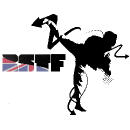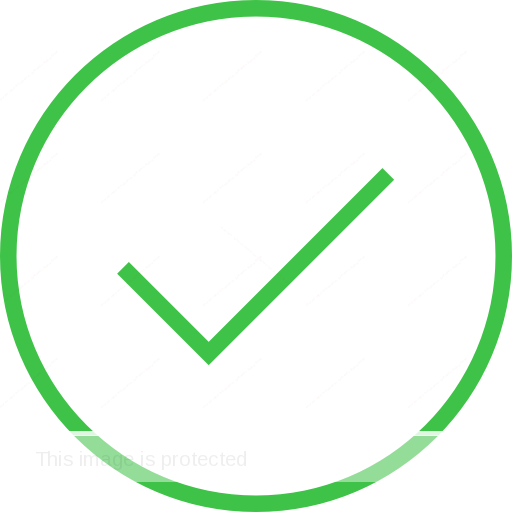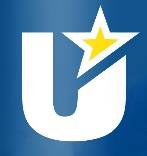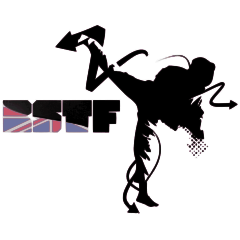Project Description
Insurance and Medical Provision
Risk Management
Like any contact sport, taekwondo presents a risk of injury which must be managed. Our policies have been designed to meet the specific needs of taekwondo competition, iterated across three decades of BSTF tournament delivery, and developed in consultation with emergency physicians and specialist medical providers.
Research suggests taekwondo holds no greater average risk of injury than other popular sports [1,2], that the most common injury type is haematoma and that injuries occur predominantly to the lower limb [3]. Since matches are substantially shorter than that of most full contact team sport competition in length and lower in frequency, the total annual-injury-exposure risk is proportionally reduced. However, all weight segmented combat sports present specific risks, particularly that contact is an objective within the competition rules and potentially harmful weight making practices.
A martial art or combat sport tournament’s health and safety protocols, and the fidelity of their implementation, are critical to risk management. Inadequate provision of trained medical staff and equipment may endanger athletes’ health and well-being. Institutions’ sport managers and club captains should be aware that the policies and provision of third party tournament organisers in the UK (including, but not limited to individuals and small associations) may vary significantly. The protocols described here cannot be taken for granted outside of BSTF events, hence, we recommend that university sport officers and club captains implement a process to review and confirm an event’s protocols satisfy your institution’s requirements whenever student-athletes enter any martial art or combat sport tournament. A checklist of essential provisions is included in the last section here for reference.
BSTF Tournament Insurance
BSTF events are independently insured under our own bespoke martial arts activities policy, ensuring coverage of all participants at our events.
Note, university club members may or may not already hold a third party insurance policy with one of a variety of different providers (such member to member policies might be purchased to cover training activities within a university club where this is not already provided for by your institution’s own activities insurance policy), however, member to member policies from a particular third party organisations are typically provide no cover at events where other participants hold different policies. Furthermore, it is not sufficient to rely on students to have obtained individual insurance policies, because:
- The various participants’ insurance may not be equivalent or sufficient for the activities
- Their policies may have expired between entry being submitted and their attending the event
See the Essential Event Procedures section for information regarding insurance claims.
BSTF Tournament Medical Provision
Provisions for the safety of participants are paramount to the organisation of combat sport and martial art competition. Typical coverage at a BSTF tournament includes Paramedic and other senior medical staff (FPoS-i/ Advanced Emergency Aid and Trauma Management in Sport qualified), supported by multiple additional medical staff (Emergency Medical Technicians/ Emergency Care Assistants/ Emergency First Aiders in Sport qualified) court-side, and with a dedicated treatment area and trauma equipment available.
Our summary policy requirements are listed in more detail in the next section, including requirements for: rules and regulations; risk assessments; medical and first aid staffing; head injury assessment protocols; medical equipment; tournament safety equipment; weight divisions; and athlete experience level divisions.
Assessment Protocols
The BSTF implements a head injury assessment protocol for the safety of student-athletes. This protocol is complimented by accreditation mechanisms which allow us to gatekeep student-athletes between matches and ensure they have been reviewed and either cleared to compete or withdrawn on advice of the medical team.
The BSTF also deliver athlete and coach development courses to raise standards in other aspects of athlete health and safety including: strength and conditioning training; nutrition and weight management; the dangers associated with weight cutting and dehydration; anti-doping and testing; and other topics.
All coaches and assistant coaches should familiarise themselves with the latest government advice on concussion management, in particular to support your athletes once they have left the care of the event medical team and may require further observation or other recommended follow-up actions.
Taekwondo Tournament Health and Safety Provision Checklist
Outside of BSTF Student National Taekwondo Championships Series events there exist a variety of third party taekwondo events large and small which a university club’s members might also attend during the year. If your club plans to attend any taekwondo competition we recommend that sport department staff and club captains always discuss whether the following checklist of provisions are in place, which are indicative of responsible health and safety policy by an organiser.
All of the provisions described in the following checklist are in place at BSTF Student National Taekwondo Championships Series tournaments:
- That an event’s risk assessment is available on request.
- That a competition’s rules and regulations are published in advance, are readily available and comprehensive.
- That matches are run according on the rules of an established international federation to ensure that the health and safety role of referees is clearly defined, and that legal scoring techniques and penalties and are applied consistently.
- That all participants are insured by a bespoke martial arts policy for any tournament open to all university clubs, and that the policy details are available on request.
- That qualified and equipped medic(s) staff sparring tournaments. The BSTF require as standard for sparring tournaments one or more Paramedic or other advanced qualifications holders oversee the event.
- That qualified and equipped emergency medical technicians/ emergency care assistants staff our sparring tournaments, supporting other medical staff in sufficient number.
- BSTF’s operating procedures require engaging for sparring tournaments a minimum of 0.7x qualified and equipped medical staff, including paramedic/ emergency medical technicians/ first-aiders plus qualified and equipped medics – referred to as the medical team – rounded up to the next whole number, per concurrently active sparring competition court, for example:
- any competition running 5 concurrent sparring courts must have a medical team of >=4 medical staff
- any competition running 6 concurrent sparring courts must have a medical team of >=5 medical staff
- any competition running 8 concurrent sparring courts must have a medical team of >=6 medical staff
- any competition running 10 concurrent sparring courts must have a medical team of >=7 medical staff
- No responsible martial art and combat sport event organiser would count their attending umpires and/ or a venue’s general staff (regardless of their first aid qualifications) towards a combat sport sparring competition’s dedicated medical staffing provision. Such staff may never be counted towards the number of medically trained staff in attendance. Only medical staff engaged solely in event medic roles during a sparring tournament may be counted towards an event’s medical staffing provision. A reduction in staffing levels below these ratios may necessitate an acute risk assessment and court closures and/or other mitigations until the staffing level is recovered.
- That the necessary equipment for trauma treatment is available, including but not limited to: O2, Entonox, airway management kit, automated external defibrillator, spinal board and full set of emergency drugs.
- That a dedicated treatment area is available court-side.
- That a Head Injury Assessment (HIA) protocol is in place, such that:
- There exists a multi-layered approach to HIAs:
- Where a player displays obvious on-court signs of concussion they are immediately and permanently removed from the competition, and a court-side HIA assessment may be replaced with immediate treatment for their concussion symptoms (HIA Assessment Category 1).
- Where the medical team determine a player has sustained an impact event with the potential for a concussion, with or without clear on-court symptoms or signs, their match will be paused and they will undergo a court-side assessment by the medical team (HIA Assessment Category 2). Based on the this assessment (which is based on the Sports Concussion Assessment Tool (SCAT 5)), the player may have their accreditation withdrawn by the medical team at that point and the match will be immediately ended by the centre referee.
- Where players present with delayed symptoms or signs suspicious for concussion, but who are not identified with an impact event with the potential for a concussion during a match, can enter the HIA protocol at a later stage, at the discretion of the medical team (HIA Assessment Category 3) at any time.
- Members of the medical team hold the independent authority to assess and withdraw an athlete’s accreditation at their discretion based on any category of HIA assessment (HIA Assessment Category 1, 2 or 3), or, any other type or kind assessment made by the medical team where concussion is recorded on an athlete’s medical record at the event.
- The medical team provide advice to athletes and their coaches, as appropriate, for event day and post-event monitoring of an athlete’s condition after a HIA and accreditation withdrawal.
- The lead medic may initiate a follow-up assessment, prior to any accreditation reinstatement decision, only where they have clear evidence that an error had been made during an earlier HIA.
- Athletes have no right or ability to appeal a HIA related withdrawal of their accreditation made by a member of the medical team under any circumstances.
- Within the competition rules coaches may ‘throw in the towel’ and withdraw their player from a match at any stage, for example, if they believe their player is outmatched, or that their player may be struggling with an injury which is not immediately noticeable by members of the medical team.
- There exists a multi-layered approach to HIAs:
- That jigsaw matting including boundary area of a minimum of 9×9 m per court is utilised for all competition areas to reduce the risk of injury from falls.
- That no ungraded (“10th kup”) students are permitted to take part in sparring disciplines.
- That suitable weight and grade (experience) divisions are in place.
- That trained umpires referee matches.
- That competition areas and spectator areas are separated, and that entry and exit between the areas is managed.
- That athletes, coaches, officials, trainee umpires and all other competition participants receive an accreditation (ID card/ eAccreditation) on registration which determines their access to the competition area(s).
- That processes are in place to check athlete and coach accreditation, both on entry to a competition area and prior to the start of each match.
- That sports department and club captains must nominate their head coach and assistant coaches during the entry process, and that only those accredited individuals may coach athletes at the event.
We also recommend that coaches attend the Strength and Conditioning for Taekwondo Athletes course which includes information about anti-doping and random testing, nutrition and weight management, and the health risks associated with rapid weight loss and dehydration.
[1] Boxing, Wrestling, and Martial Arts Related Injuries Treated in Emergency Departments in the United States, 2002-2005, J Sports Sci Med. 2007 Oct; 6(CSSI-2): 58–61. [2] Australian sports injury hospitalisations 2011-12 (full publication; 21 oct 2014 edition) (AIHW). [3] Lystad, Reidar. (2015). Epidemiology of injuries in full-contact combat sports. Australasian Epidemiologist. 22. 14-18.


































